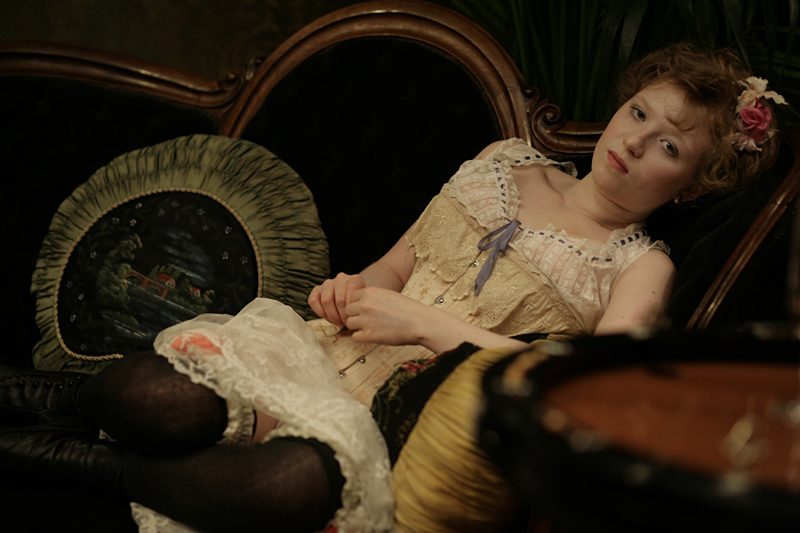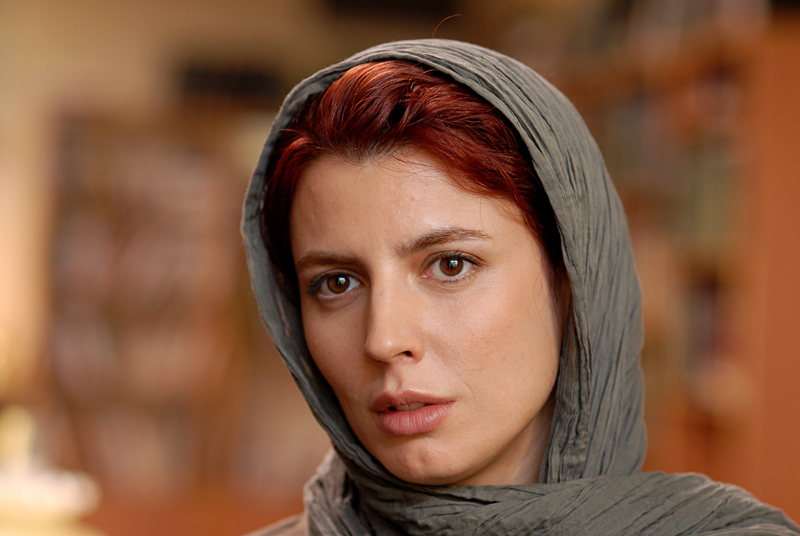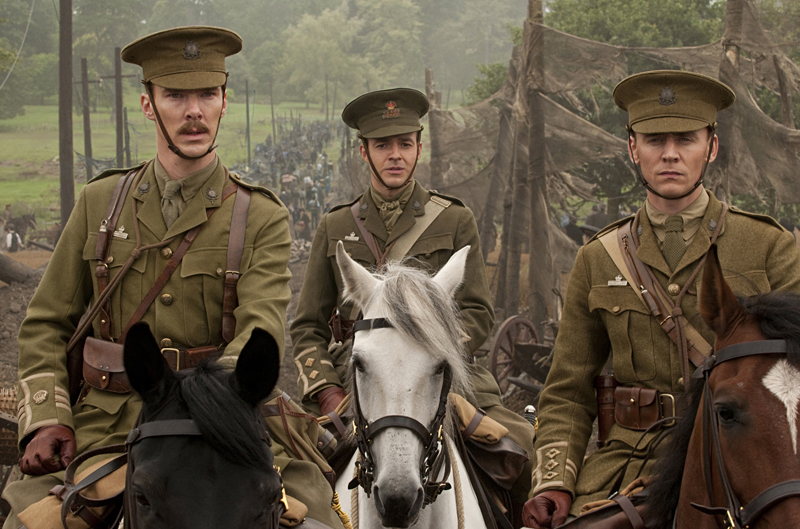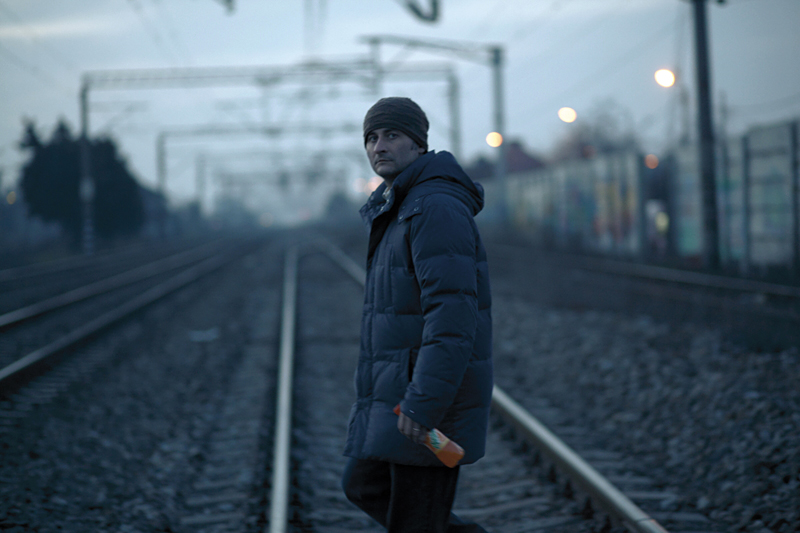The protag of Mike Leigh’s Happy-Go-Lucky is a modestly gaudy people’s heroine industriously repairing the social world, one frayed interaction at a time. After extended cameos in two previous Leigh films (as a resourceful pop tart in All or Nothing and the date-raped rich girl in Vera Drake), fine-boned Sally Hawkins shoulders the burden of every scene as the most relentlessly upbeat 30-year-old kindergarten teacher ever to bicycle London’s chartered streets. The blithe spirit who animates Happy-Go-Lucky is a priestess of positive polarization; she’s either irritating or endearing—whichever you find her, you have to wonder why.
Poppy is introduced pedaling through traffic, grin on her face and hair in the wind. Idly browsing in a bookstore (and utterly failing to engage the surly clerk), she spots a title on the shelf and chirps, “The Road to Reality—don’t want to be going there.” Indeed, Poppy can smile even when her bike is stolen: “Oh, no! I didn’t even get a chance to say goodbye.” And when she hurts her back in the course of a daily regimen on the trampoline, she’s able to laugh through the pain. Poppy, in short, is a very cheerful girl, and that cheer is her good fortune.
Heroic optimism is a surprising ploy in the post-Soviet cosmos. Walking out of this daringly non-ironic movie, a less enthusiastic colleague characterized Poppy as “the Idiot”—as in the Dostoevsky novel. It’s an illuminating comparison. Generous, guileless, and self-effacing to a fault, Dostoevsky’s saintly Prince Myshkin has a catalytic effect on the fallen, grown-up society in which he moves. As does Leigh’s “idiotic” heroine.
With her sharp features, toothy smile, and bright eyes, Hawkins has the creature cuteness of a Disney chipmunk. Her character is naturally friendly, pleased to make eye contact with strangers, an empathetic fount of jokey banter and playful innuendo. (Typically dressed in fauvist floral prints, clashing textured tights, and high-heeled cowgirl boots, Poppy is also fun to watch—”she’s a rainbow,” as the Rolling Stones once sang with a sarcasm that the movie never even remotely approaches.) One ponders the mystery of Poppy’s personality, waiting for the meds to wear off. They never do, although midway through the movie, there’s a surprising flash of seriousness revealed in her response to an incident of schoolyard bullying.
Even more than most of Leigh’s collectively developed films, Happy-Go-Lucky is a movie about an actor’s performance. But it’s also deeply concerned with the nature of pedagogy. Poppy not only teaches, she also learns. Leigh extracts maximum vaudeville from the wildly melodramatic flamenco class his protagonist attends, and unobtrusively constructs his narrative around her five lessons with the tightly wound, increasingly nutty driving instructor Scott (Eddie Marsan, another graduate of Vera Drake, in a furious, spittle-spewing performance that equals Hawkins’ in intensity). Amiable as she is, Poppy can’t help teasing this paranoid crank—”You celebrate chaos!” he shouts at her—but she does learn from their interactions, each of which has a message all its own building up to the movie’s climax.
Poppy’s innate concern, her refusal to judge and willingness to listen to anybody, is demonstrated when she meets another sort of madman in a spot desolate enough to serve as the set for a Beckett play. These encounters—spluttering Scott and a muttering vagrant—afford the movie’s most intense interactions, although Poppy, who never breaks character, is always relating. She’s given an equally good-natured and unflappable housemate (Alexis Zegerman) with whom to riff, as well as pupils, sisters—one clownishly sullen, the other fearfully judgmental—and colleagues of both genders.
As the critic Harold Rosenberg observed, Dostoevsky’s Myshkin is “less a dramatic figure than an edifying one,” and, in writing The Idiot, the author was urgently seeking something beyond art—namely that which “man can be.” It would be unfair to burden the entertaining and occasionally glib Happy-Go-Lucky with such weighty intent, but, for all his reputation as a sour miserablist, Leigh has made some blatantly utopian movies—most obviously his paean to popular art, Topsy-Turvy, and, in a different register, the pro-choice passion play Vera Drake.
More than a few critics were troubled by the unrealistically safe saline abortions performed by Vera Drake‘s angelic outlaw heroine. But in opposing a criminal state, this warmhearted busybody embodied the promise of a more enlightened social order—the safe, reassuring abortionist of the future. So it is with the altruistic Poppy, whose adult devotion to education and occasionally expressed childish desire to fly seem to herald a further stage of human development.
Will this lighthearted creature fulfill her earthly mission? At the very least, the spectacle of Poppy’s devotion and desire, not to mention her all-around sunny disposish, left this viewer feeling unaccountably happy—at least for the moment.








